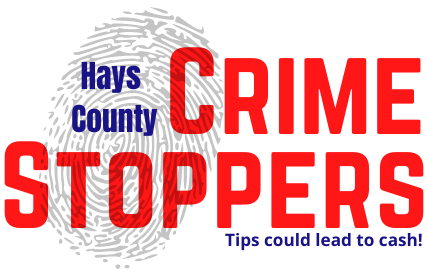By Natalie Frels
natalie@haysfreepress.com By Natalie Frels
natalie@haysfreepress.comon February 1, 2023
Hays County organization aids in nabbing record number of criminals
HAYS COUNTY — In early January, Hays County Crime Stoppers (HCCS) Executive Director Sgt. Jeffrey Jordan received an anonymous tip regarding an individual wanted for assaulting a public servant. Days later, on Jan. 12, more than 230 miles away, the Arlington Police Department arrested Aladria Walker for outstanding warrants, with additional charges from the Arlington and Grand Prairie police departments.
With a fifth arrest for 2023 under its belt, HCCS is aiding law enforcement across the state and nation by reinvigorating its program and educating, engaging and empowering the community, thrusting itself into relevancy as a means to bring criminals to justice.
When most people think of Crime Stoppers, they think of an anonymous tip line. But it’s so much more than that. There are several ways to submit a tip. Anyone can call the hotline 24 hours a day, seven days a week. In fact, the organization receives approximately a dozen tips through the hotline per month, Jordan said.
However, during a time when information is at the tip of our fingers, individuals can also submit tips online.
“Communication has totally changed,” said Gary Tucker, chairman of HCCS. “We have a team of folks and board members and an incredibly good executive director and we reoriented how we communicate with the community. It was originally a tip hotline. Later, we had P3 software, which is webbased. So, we get tips in different ways.”
With an encrypted account, citizens can anonymously share information with the organization in real time through its P3 software without disclosing their name, location or any identifying details, allowing a liaison to pass along tips to law enforcement. Even if the tipster is in another location, they can choose to report a tip to a certain area — all incognito.
“We don’t have any way of knowing who it is,” Jordan said. “We can communicate real-time, so we can ask questions. They can send pictures and video and we can forward those straight to the agency representative. Over the last year, we brought in all of our agencies in a law enforcement advisory capacity. We can talk to the detective [leading the investigation] and once the tip is forwarded, they can ask us to request specifics regarding the tip’s content. We can send them [essentially] a text or instant message, back and forth, almost like having a conversation. Our job isn’t to identify them.
Our job is to keep them anonymous. It’s to protect them and keep them safe.” Kim Hilsenbeck, chair of the HCCS campus conference and campus committee, added, “If you want to remain anonymous, you call Crime Stoppers. If you call your local police, they have your name, phone number, address — all of that … We’re trying to educate the public. Crime Stoppers exists to have this safe space. If you call your local police or sheriff’s office, that’s all negated … Everyone has heard of Crime Stoppers.
There are folks that think it’s just a law enforcement thing and it’s not. We have a relationship, we have a partnership, but we’re separate entities.”
With the implementation of the app and P3 software, more and more people are reaching out to share what they know and ultimately bring criminals to justice.
In the past year, HCCS received tips that led to a record number of arrests in its history, which began as San Marcos Crime Stoppers in 1981 and was later reenvisioned to serve all of Hays County in 1991. In the past five years, however, Jordan said the activity has increased threefold.
“We used to do six to eight [arrests per year],” the executive director said. “With 49 arrests last year, it’s the most we’ve ever done in one year.”
Now, the organization receives anywhere from 20 to 60 submissions per month. As of Jan.
17, a lifetime total of 783 arrests have been made in connection with HCCS, 924 cases have been cleared and 69 fugitives have been arrested. Cash, property and drugs in dollars amassed a total amount recovered of $13,094,046.
Hilsenbeck stressed that the individuals arrested as a result of a Crime Stoppers tip are commonly repeat offenders.
“People want a safe community. The thing I’ve seen with Crime Stoppers is that when we get to an arrest and we take that person off the street, these are, a lot of the times, repeat offenders. You’re not just talking about a single offender,” she said.
“We’ve closed cases that are years old. There’s a real connection to keeping your neighborhoods and campuses safer when you talk about repeat offenders.”
Jordan recalled one case of a car burglary that resulted in the closing of more than 30 cases between Bexar and Williamson counties.
“A lot of people ask, ‘Why aren’t you called Crime Solvers?’ We’re not investigating. We are trying to stop crime.
The Most Wanted are not there because they’ve done something simple.
By getting them off the streets, we are, indeed, helping to stop crime,” said Steve Meyer, vice chairman of HCCS.
“It’s important that we ask, ‘How can we help society?’ We’re trying to stop crime by getting the repeat offenders and most recidivist and most dangerous people off the street to make society safer.”
Further, the tips themselves are not even just about crime anymore, Jordan added. Now, the information provided can range from welfare checks on suicidal individuals to events in schools.
“We’re able to forward that [information] to local law enforcement for a welfare check to make sure that individual is okay,” he said. “Sometimes that’s an easier way to get those things reported for some people than calling 9-1-1.”
Hilsenbeck credits this shift and increase in efficacy and engagement to a change in leadership starting in September of 2021, when Jordan became the executive director.
“I think it’s fair to say that this organization was on life support a year ago,” Hilsenbeck said. “It was older people on the board who had not breathed enough life into this in a while, so now you have someone who is coming in with new ideas, looking at things from a fresh perspective, building a whole new board and just reinvigorating it. It’s got a lot of new ideas and new energy that maybe didn’t exist for a while.”
Jordan said it’s a team effort.
“The biggest part of it, though, has really been communication — whether that’s through social media, doing a presentation somewhere, just talking with people,” he said. “We’re talking about the program, why it’s important and why it’s still valid. That’s one of the big things — the program is still valid; it’s just had to evolve.”
Posting HCCS’ Most Wanted list is just one example, Tucker said.
“With the technology, [the organization] is constantly updating the list. The information is current and fresh in the community’s mind,” he said. “There is repetition in the daily lives of individuals who see updates on social media.
It’s almost like we care the information is getting out and people in the community want to be a part of the community and help.”
Not only does HCCS get out into the community with events and presentations, but the organization is also engaging with citizens on a whole new level with the prevalence of social media. Awareness builds as people tag other users in the comments and share Crime Stoppers’ posts.
“Whether it’s through social media, the community, law enforcement or media, our goal is threefold: it’s to educate, to empower and to engage. And we’re doing all three of those things,” Jordan said. “By just making people aware of what’s happening and how to keep people safe, they’re empowered by stepping up and providing us tips.”
It’s a positive cycle: as HCCS sees results, the community, in turn, becomes more engaged.
“As we’ve become more visible, [citizens] are more interested in what’s happening and how they can help,” said Meyer.
“And that’s what we’re seeing more and more from the community because there is concern about safety in the community right now.”
For the first time in its history, HCCS is working with every law enforcement agency in the county and is in the process of connecting with every high school in the county as well.
In fact, reaching out to teens is an important initiative for the countywide organization. Not only are many local youths involved, but one of the 12 ambassadors in the state hails from Hays High School, Hilsenbeck added. “It’s prestigious.”
Additionally, more and more community youth are getting involved. From Feb. 6-8, Hays County will host the 27th Annual Texas Crime Stoppers Campus Conference. Hundreds of student volunteers, administrators, program sponsors and school resource officers from across the state are expected to gather at the Embassy Suites in San Marcos for the “Clued In” event, which promises a great learning experience with a focus on current trends and issues seen on campuses and in the local communities, including the following topics: cyberbullying, school violence and threats, distracted driving, sex trafficking, online predators and fentanyl.
HCCS is currently seeking community sponsors for the annual conference to invest in the next generation.
“We’re trying to focus our efforts so that students become change agents in their communities. If community and campus safety is not at the top of our minds right now, then we’ve got a problem.
I’ve got kids in school and I can’t tell you how many times you hear about school shootings and your heart stops,” Hilsenbeck said. “This is the next generation that’s going to go back and make a change in their community, but we have to give them the voice to do that — the tools, the knowledge, the permission — to go do that. They have to be a part of the conversation.
You [sponsors] are not just helping us throw a conference; you’re helping us to create 350 change agents to go back into their communities all over the state and change the conversation.
“Let’s be more proactive. Law enforcement can’t really help until a crime has already happened. Can we do other things before that as a community, as a school, as a campus?
Help us educate this next generation of kids and give them the tools that they need to be the leaders, because if we don’t change the conversation, we’re screwed.”
HCCS offers a variety of sponsorship opportunities at different levels to help support the conference.
Individuals interested in sponsoring “Clued In” are invited to visit the website at
www.callcrimestoppers. com.
To submit a tip to Hays County Crime Stoppers, visit the organization’s website, download the P3Tips mobile app or call 1 (800) 324-TIPS.
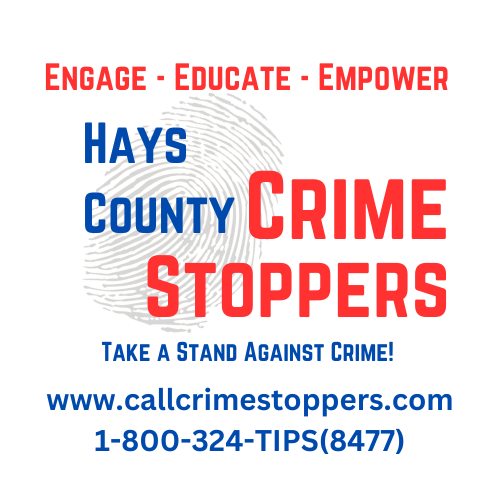


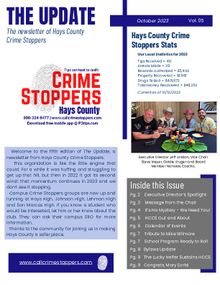 PDF
PDF

 PDF
PDF
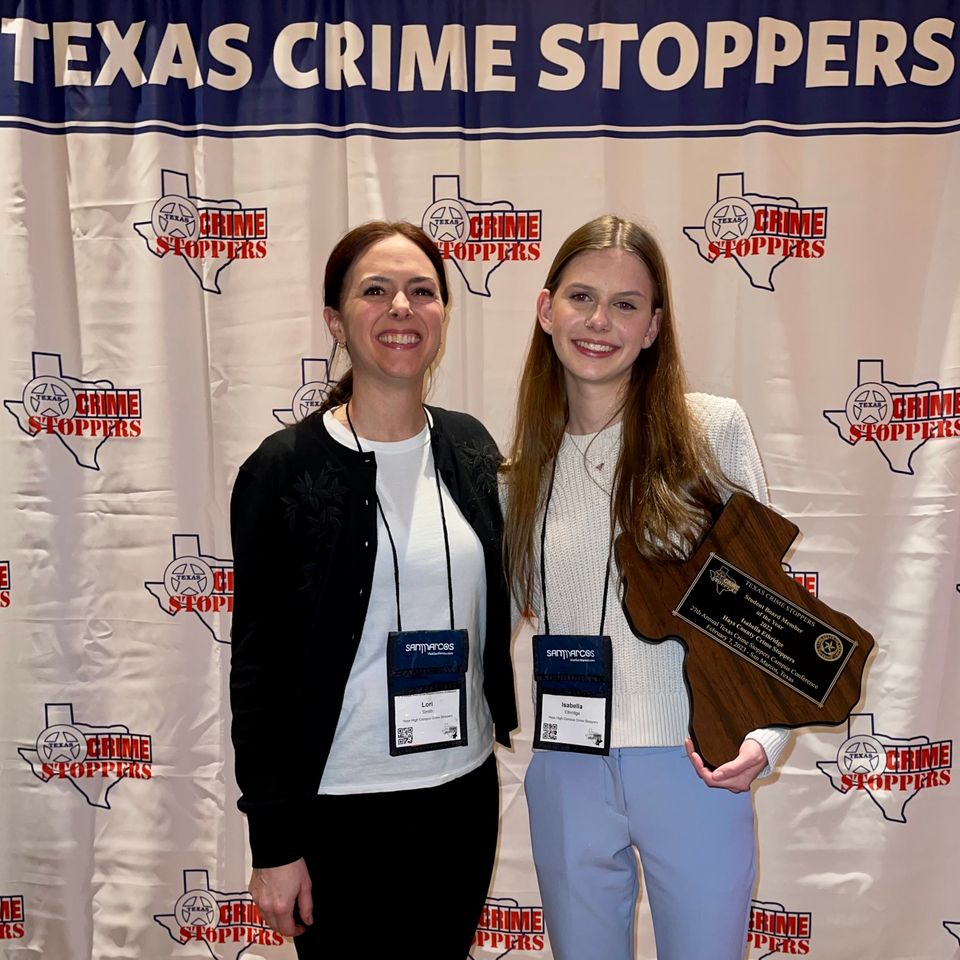

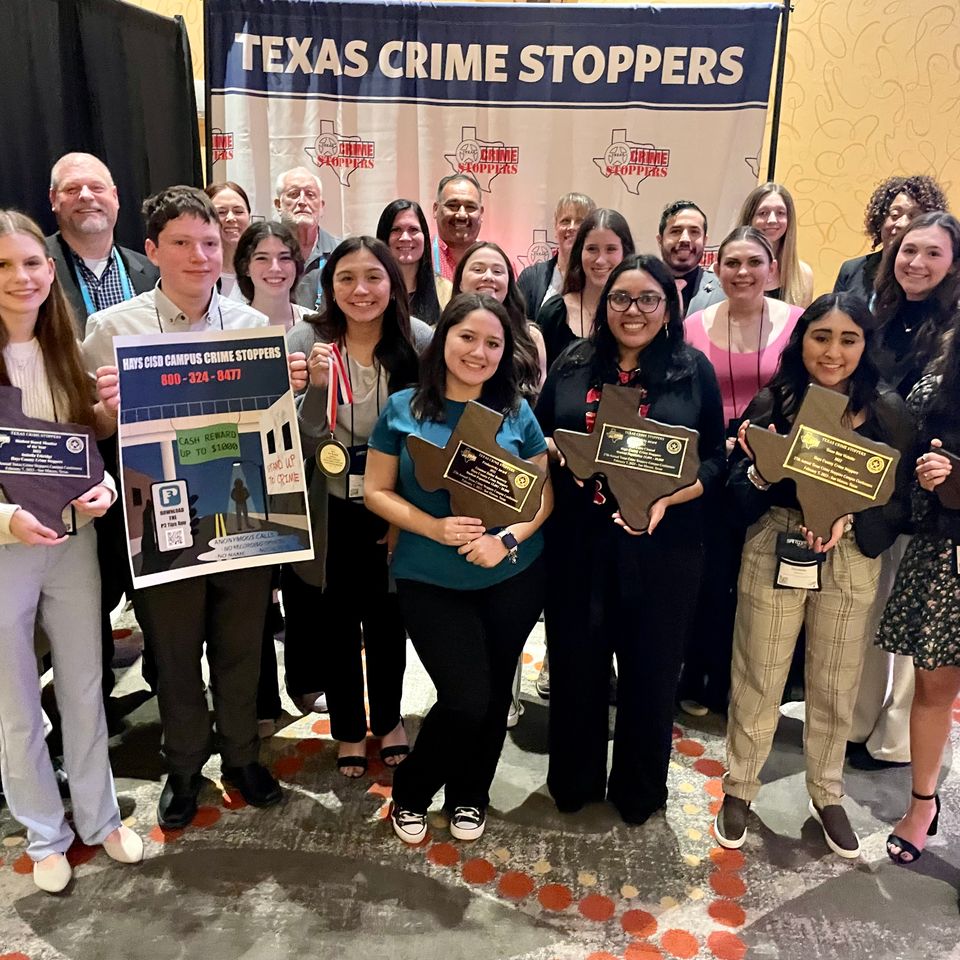
 PDF
PDF

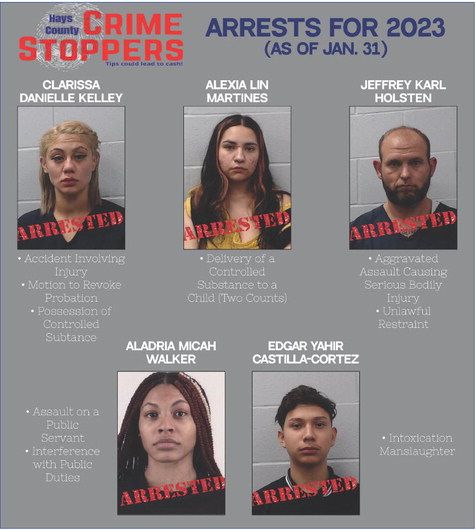
 PDF
PDF

 PDF
PDF

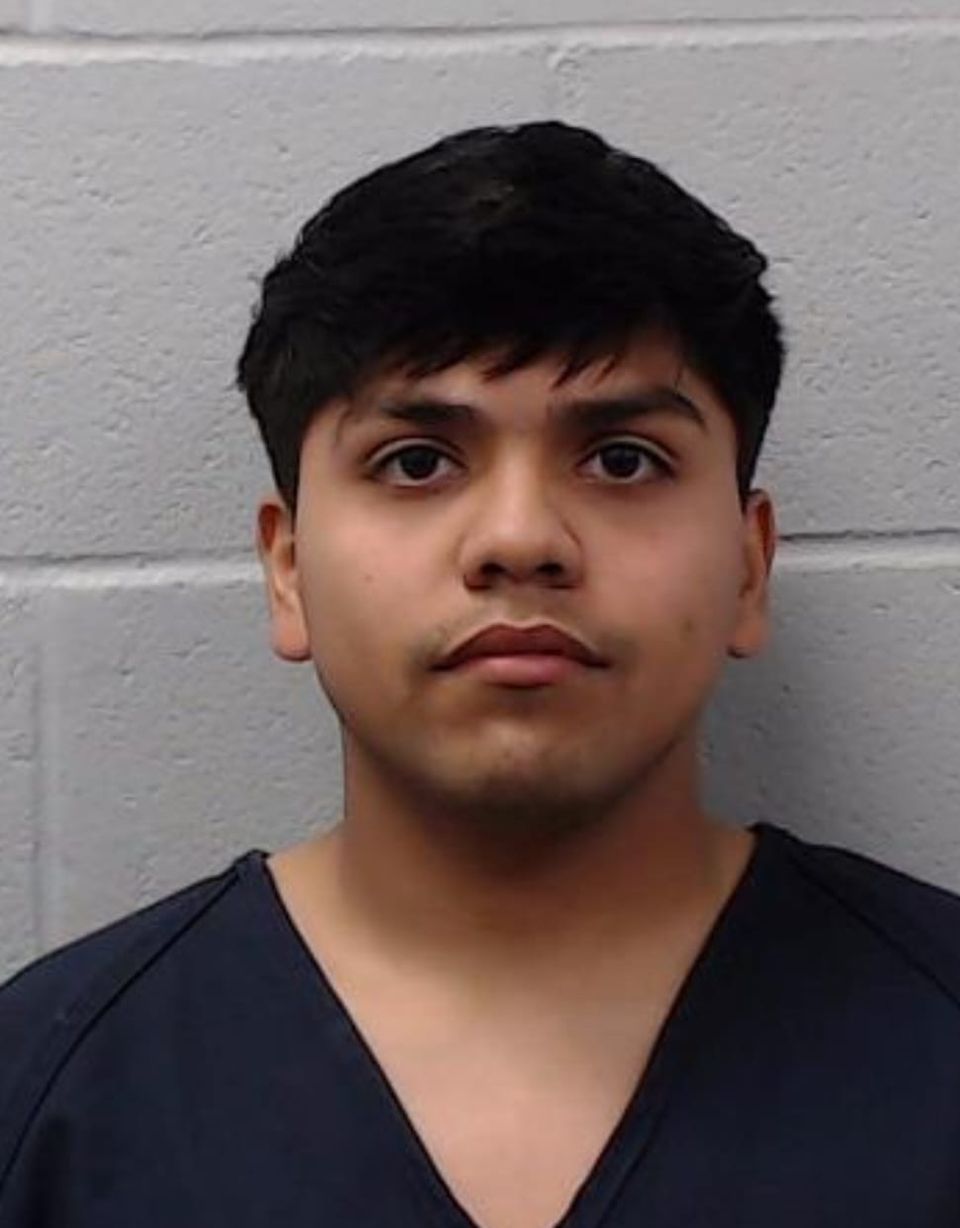
 PDF
PDF

